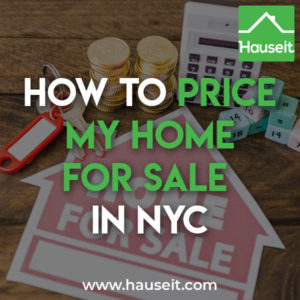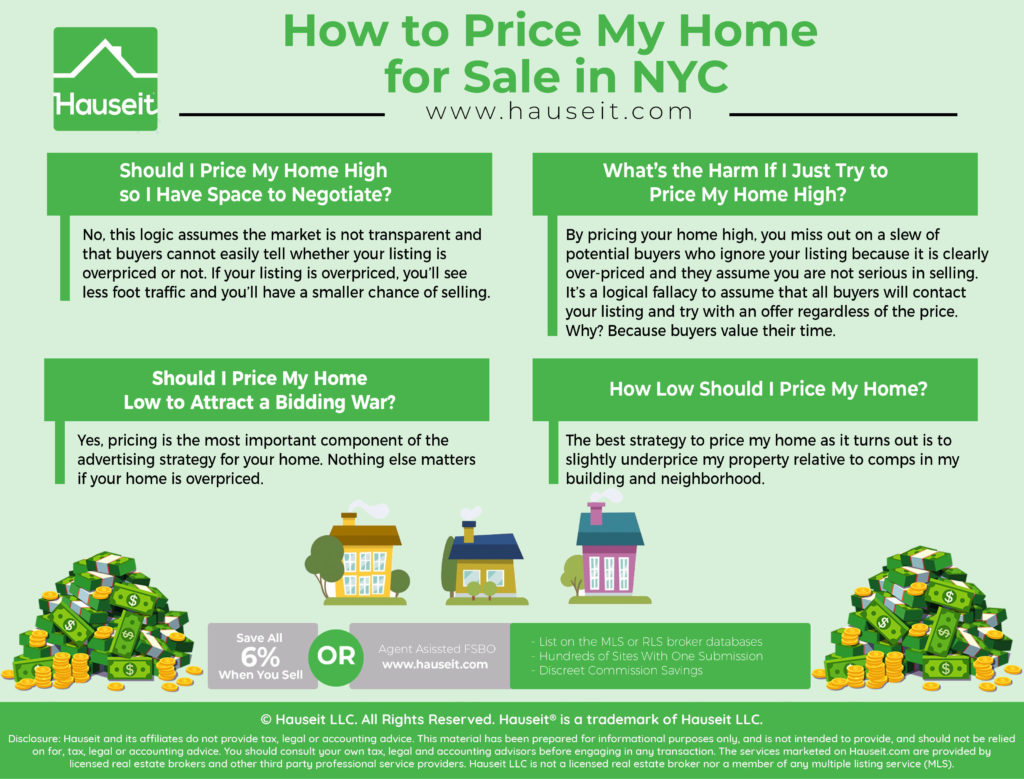One of the toughest problems home owners grapple with is how to price my home when it comes time to list it for sale. Should you set a high initial listing price to give yourself room to negotiate? Or should you price your home low to get more foot traffic to your listing so you can induce a bidding war? We’ll discuss all this and more in this article, from how to price your home to inducing a bidding war.
Table of Contents:

Pricing your home high is one of the biggest and most common mistakes novice sellers and real estate agents make. The mistake of pricing your home too high can be irreversible, especially if your home ends up sitting on the market for too long.
Why do sellers make this time again and again? Well, it’s often because of the seller’s emotional attachment to the home. Every New Yorker’s home is their castle.
We all believe that our home is the best thing ever, and we love and appreciate every little detail about it. However, this personal preference can lead to irrational pricing.
Another reason New York home sellers often price their home too high is because of the inexperienced real estate listing agent they chose. Inexperienced agents will often compete for business by promising a high sale price to potential sellers. As a result, they set everyone up for disappointment when the market inevitably tells them that their listing is mispriced.
What if the market is soft and buyers are used to submitting offers lower than the asking price? Doesn’t it make sense for me to price it high so that I can have room to counter and negotiate? If I don’t price it high, wouldn’t buyers come in with offers below the asking price anyway? These are all questions that fearful sellers typically ask when confronted with the decision of whether to price a home high or low.
The problem with the above logic is that it assumes the market is not transparent and that buyers cannot easily tell whether your listing is overpriced or not.
Sure, if buyers have no idea where other units in your building sold and what other comparable properties are on the market, then it may make sense to assume buyers will bid blindly without regard to data.
However, the truth is that the NYC real estate market is extremely transparent today. Buyers can search any number of popular real estate websites to see past sales and current listings in your building and neighborhood. It’ll be all too easy for buyers to find out that the apartment of your same layout on the floor above you is listed for $100,000 less and the same line below you recently sold for $150,000 less.
Good luck blindsiding buyers with your overpriced strategy then!
The key takeaway is I should not price my home based on the strategy of trying to trick buyers into thinking they’re getting a bargain when I negotiate down from my initial listing price. In all seriousness, buyers will know that your listing is way over priced to begin with. Any real estate agent that tries to convince you that this is a winning strategy is either an imbecile or hasn’t been in business for too long.
A Full Service Listing for 1%
Sell your home with a traditional full service listing for just one percent commission.
Pricing your home high can cause irreversible damage to your chances of selling your home at a price that is acceptable to you.
By pricing your home high, you miss out on a slew of potential buyers who ignore your listing because it is clearly over-priced and they assume you are not serious in selling.
It’s a logical fallacy to assume that all buyers will contact your listing and try with an offer regardless of the price.
That doesn’t make sense because you’re assuming that the time of a buyer is not valuable. Why would they waste time negotiating an offer with a seller who is clearly unrealistic or simply testing the market? Because of this core truth, many buyers will not even bother to contact the listing agent of an overpriced property in the first place.
Pricing your home high also increases the risk of your home being excluded in the search filters of the majority of buyers who only want to see properties within a certain budget. For example, if your property is worth $2.9 million and you would sell it for $2.9 million, why on earth would you price it at $3.3 million?
Not only would you exclude a wide swath of buyers who search only for properties under $3 million, you’d be excluding real buyers who are qualified and want a property that is worth around $3 million. Furthermore, the buyers you didn’t exclude are those looking for properties likely under $4 million or $5 million, in which case your property would be too small or not a fit for them in the first place.
What you’ve essentially done is excluded the majority of eligible buyers from an easily avoidable mistake.
Pricing your home too high in a soft market will put you in an extremely weak negotiating position as your home sits on the market for months. When you inevitably decide to reduce your listing price, buyers will automatically know that you clearly don’t have any offers. This can become a death spiral if you actually need to sell, and can cause a sale to happen at fire sale prices when you are backed into a corner by a vulture investor.
Furthermore, pricing your home high in a soft market is an especially terrible proposition because new properties will constantly be listed for sale at prices that undercut your high listing price. In a declining market, new comparable properties will keep appearing at lower and lower prices. This has the effect of making your property look less and less attractive.
Pricing is the most important component of the advertising strategy for your home. Nothing else matters if your home is overpriced. As a result, instead of gimmicks like increasing the commission offered to buyers’ agents to 4% or offering a special bonus to buyers’ agents, just lower the price!
So should I price my home very low to almost certainly induce a bidding war? Well, it depends.
We’ve seen sellers initially want to list their home at $3 million, and then change their mind and decide to list it at $2 million and dramatically below where they’d actually sell it.
This strategy is too drastic even though it will be certain to cause a real estate bidding war in NYC. In fact, we saw a substantial increase in the number of direct buyers on this listing, perhaps due to the very fact that buyers were climbing over each other to see it. These are all normally very good things, but pricing it too low may not have the outcome you wish for.
Why is pricing it extremely low a bad idea? Primarily because a bidding war starting from a very low initial listing price may not reach a price that is acceptable to you. In our example, it will take a lot for a buyer that is pre-approved to purchase a $2 million property to bid $1 million above the listing price and their budget.
However, even though you may get some buyers who aren’t qualified to purchase something dramatically higher than the low listing price, the upside is that all press is good press. The more buyers and agents you get through the door, the better. People will talk, and agents will have your listing in mind even if the buyer they initially bring isn’t qualified to pay more than the asking price.
Get a 2% Rebate When You Buy
Save thousands on your home purchase with a buyer agent commission rebate from Hauseit
The best strategy to price my home as it turns out is to slightly underprice my property relative to comps in my building and neighborhood.
As we’ve discussed, the market is very transparent and both owners and potential buyers will be able to see what has sold and what is currently for sale in the building and neighborhood.
If 1 bedroom condos of comparable quality in your neighborhood that are roughly 1,000 square feet are trading for $1,500 price per square foot (PPSF), then you should slightly under price your listing to that average.
Just remember that re-sale condos will trade at a lower valuation vs new construction condos, so you should compare like for like.
Even better, fine tune your listing price by looking at current and past sales in your building, preferably of the same line (exact same layout) or similar layout (i.e. other 1 bedrooms, different lines with mirror layouts).
For example, are other 1 bedrooms in your building being listed for $1,700 PPSF when similar units in the neighborhood are being listed for $1,500 PPSF? Then you’re in luck and won’t have to list as low in order to look attractive relative to the overpriced listings in your building.
Of course, this assumes that your unit is superior in some substantial way over the average unit for sale in your neighborhood. If your unit and building aren’t much different vs the average unit for sale in the neighborhood, then you might as well list it at the neighborhood average to avoid the fate of overpriced sellers we’ve discussed earlier.
Save 2% On Your Home Purchase
Save thousands on your home purchase with a buyer agent commission rebate from Hauseit
Disclosure: Commissions are not set by law or any Realtor® association or MLS and are fully negotiable. No representation, guarantee or warranty of any kind is made regarding the completeness or accuracy of information provided. Square footage numbers are only estimates and should be independently verified. No legal, tax, financial or accounting advice provided.






